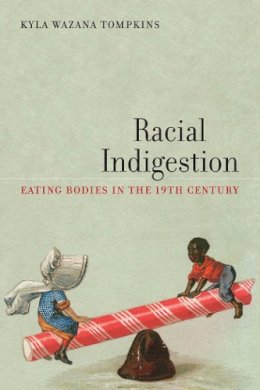9%OFF

Stock image for illustration purposes only - book cover, edition or condition may vary.
Racial Indigestion: Eating Bodies in the 19th Century
Kyla Wazana Tompkins
€ 33.99
€ 31.02
FREE Delivery in Ireland
Description for Racial Indigestion: Eating Bodies in the 19th Century
Paperback. Sheds light on contemporary "foodie" culture's vexed relationship to nativism, nationalism and race privilege Series: America and the Long 19th Century. Num Pages: 288 pages, black & white illustrations, colour plates. BIC Classification: 1KBB; 2AB; 3JH; DSB; HBTB; JFCV; JFSL. Category: (P) Professional & Vocational. Dimension: 226 x 152 x 23. Weight in Grams: 544.
Winner of the 2013 Lora Romero First Book Publication Prize presented by the American Studies Association
Winner of the 2013 Association for the Study of Food and Society Book Award
Part of the American Literatures Initiative Series
The act of eating is both erotic and violent, as one wholly consumes the object being eaten. At the same time, eating performs a kind of vulnerability to the world, revealing a fundamental interdependence between the eater and that which exists outside her body. Racial Indigestion explores the links between food, visual and literary culture in the nineteenth-century ... Read more
Product Details
Publisher
New York University Press United States
Number of pages
288
Format
Paperback
Publication date
2012
Series
America and the Long 19th Century
Condition
New
Weight
513g
Number of Pages
288
Place of Publication
New York, United States
ISBN
9780814770030
SKU
V9780814770030
Shipping Time
Usually ships in 7 to 11 working days
Ref
99-50
About Kyla Wazana Tompkins
Kyla Wazana Tompkins is Professor and Chair of Global Gender and Sexuality Studies at the University at Buffalo, and Professor of English at Pomona College. She is the author of Racial Indigestion: Eating Bodies in the Nineteenth Century and managing editor of Keywords for Gender and Sexuality Studies. She is the winner of numerous book awards; in 2023, she won ... Read more
Reviews for Racial Indigestion: Eating Bodies in the 19th Century
Kyla Wazana Tompkins's study on eating in nineteenth-century America is mesmerizing. From the playful literary history of children's tales in the antebellum period to the tightly woven cultural analysis of chromo-lithographed trade cards for food products in the Gilded Age, Tompkins convincingly makes the case that eating as a social practice was inextricably tangled with the construction and performance of ... Read more
